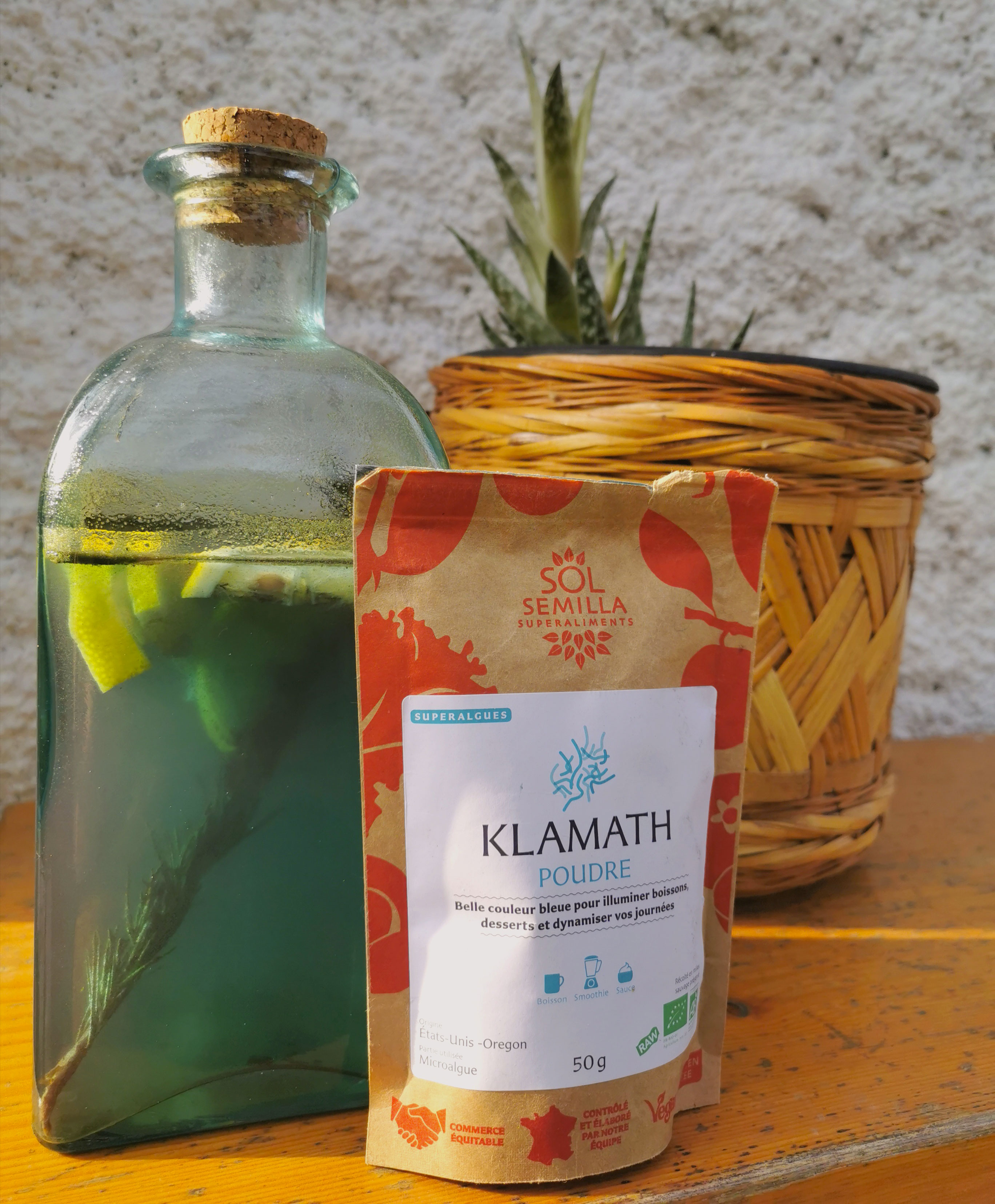Like other freshwater microalgae (Spirulina, Chlorella), the origin of Klamath dates back to the very beginning of organic life on earth.
Unlike its sisters that can now be cultivated, Klamath is a wild algae, collected in only one place in the world: Klamath Lake in Oregon (USA), a pure preserved microcosm. Considered one of the most complete foods that exist in nature as well as one of the densest adaptogens, Klamath has so many nutrients that it is impossible to list them on a label.
This is why we decided to write a separate document to give thanks to this exceptional food as well as the fruit of our analyses and research.

1. Nutritional values
| Name | Value for 100g |
Percentage for 100g* |
|---|---|---|
| Energy | 361.00 kcal | |
| Fats | 4.44 g | |
| of which saturated fatty acids | 0.002 g | |
| Carbohydrates | 19.00 g | |
| including sugars | 0.80 g | |
| Dietary Fiber | 5.50 g | |
| Proteins | 73.79 g | |
| Salt | 0.50 g | |
| Beta Carotene | 135,601 µg | |
| Retinol - Vit A | 22,600 µg | 2,825% |
| Tocopherol - Vit E | 275.17 mg | 2,293% |
| Vitamin K | 2,640 µg | 3,520% |
| Thiamine - Vit B1 | 24.1 mg | 2,191% |
| Niacin - Vit B3 | 410 mg | 2,563% |
| Folic Acid - Vit B9 | 7,200 µg | 3,600% |
| Cobalamin - Vit B12 | 38,000 µg | 1,520,000% |
| Pantothenic Acid - Vit B5 | 160 mg | 2,667% |
| Iodine | 2,510 µg | 1,673% |
| Arginine | 4 120 mg | |
| Lysine | 3,350 mg | |
| Glutamine | 14,000 mg |
| Name | Value for portion of 2g |
Percentage for portion of 2g |
|---|---|---|
| Energy | 7.22 kcal | |
| Fats | 0.99 g | |
| of which saturated fatty acids | 0.00 g | |
| Carbohydrates | 0.38 g | |
| including sugars | 0.02 g | |
| Dietary Fiber | 0.11 g | |
| Proteins | 1.48 g | |
| Salt | 0.01 g | |
| Beta Carotene | ||
| Retinol - Vit A | 452 µg | 56.5% |
| Tocopherol - Vit E | 5.50 mg | 45.9% |
| Vitamin K | 52.80 µg | 70.4% |
| Thiamine - Vit B1 | 0.48 mg | 43.8% |
| Niacin - Vit B3 | 8.20 mg | 51.3% |
| Folic Acid - Vit B9 | 144 µg | 72.0% |
| Cobalamin - Vit B12 | 760 µg | 30 400% |
| Pantothenic Acid - Vit B5 | 3.20 mg | 53.3% |
| Iodine | 50.20 µg | 33.5% |
| Arginine | 82.40 mg | |
| Lysine | 67.00 mg | |
| Glutamine | 280.00 mg |
* Reference intake for a typical adult (8,400 kJ / 2,000 kcal)
Vitamin A is present as pro-vitamin A or Beta-carotene in Klamath.
Beta-carotene is a precursor to vitamin A.
2. Allegations
For the portion, the Klamath is:
- Low energy value.
- Rich in protein.
- Very low in salt.
2.1 Immune System
Vitamins A, B9 (Folate) and B12 contribute to the normal functioning of the immune system.
2.2 Antioxidant / Oxidative Stress
Vitamin E helps protect cells against oxidative stress.
2.3 Cardiac System
- Vitamin B1 (Thiamine) contributes to normal heart function.
- Vitamins B9 (Folate) and B12 contribute to the normal formation of red blood cells.
- Vitamin B9 (Folate) contributes to normal blood formation.
- Vitamin B12 contributes to normal homocysteine metabolism.
- Vitamin K contributes to normal blood clotting.
2.4 Psychological Functions
- Vitamins B3 and B12 contribute to normal psychological functions.
- Vitamins B3 and B12 as well as Iodine are necessary for normal mental functioning.
- Vitamin B9 contributes to maintaining cognitive performance.
- Vitamin B12 supports cognitive performance.
- Vitamins B3, B5 and B12 are essential for mental functioning and mental performance. They:
- contribute to maintaining activity, memory, perception of the environment, particularly in elderly subjects.
- promote mental focus.
- stimulate mental abilities such as learning, reasoning, memory.
- improve the psycho-emotional state.
- Vitamins B5 and B9 are important for mental functioning and mental performance in aspects such as concentration, learning, memory, reasoning as well as resistance to stress.
- Iodine plays a role in brain development.
2.5 Nervous System
Vitamins B1 (Thiamine), B3 (Niacin), B12 and Iodine contribute to the normal functioning of the nervous system.
2.6 Vision
- Vitamin A contributes to the maintenance of normal vision.
- Vitamin A is necessary for night vision.
- Vitamin E contributes to the protection of the retina and lens from damage caused by free radicals.
2.7 Reduction of fatigue
Vitamins B3, B5, B9 and B12 contribute to reducing tiredness and fatigue.
2.8 Bones
- Vitamin K contributes
- to maintain normal bone structure.
- to promote bone remineralization.
- Vitamin K helps reduce bone loss.
2.9 Skin – Mucous membranes
- Vitamins A and B3 contribute to the maintenance of normal skin and mucous membranes.
- Iodine contributes to the maintenance of normal skin.
2.10 Energy and Vitality
- Vitamin B3 is necessary for maintaining overall energy and vitality.
- Vitamins B1, B3, B5 and B12 and Iodine contribute to normal energy-yielding metabolism.
2.11 Other allegations
- Vitamin A contributes to iron metabolism and to maintaining normal iron levels.
- Vitamin B1 contributes to the metabolism of carbohydrates and proteins.
- Vitamin B5 contributes to the normal synthesis and metabolism of steroid hormones, vitamin D and certain neurotransmitters.
- Pantothenic Acid (Vit B5) contributes to macronutrient metabolism.
- Vitamin B12 plays a role in the process of cell division.
- Iodine contributes to the production of thyroid hormones and the normal functioning of the thyroid.
- Iodine contributes to the normal growth of children.
Klamath contains many essential and non-essential vitamins, minerals and amino acids, but the values per serving are lower than the minimum recommended values. This does not allow us to justify their benefits here.
For your information, in a 2g serving of Klamath Powder, the following elements are present.
- Vitamin C: 5%
- Vitamin B2 (Riboflavin) and Iron: 4%
- Vitamin B6: almost 4%
- Vitamin B8 (Biotin), Potassium, Calcium: just over 1%
- Copper: 2%
- Manganese and Selenium: 3%













